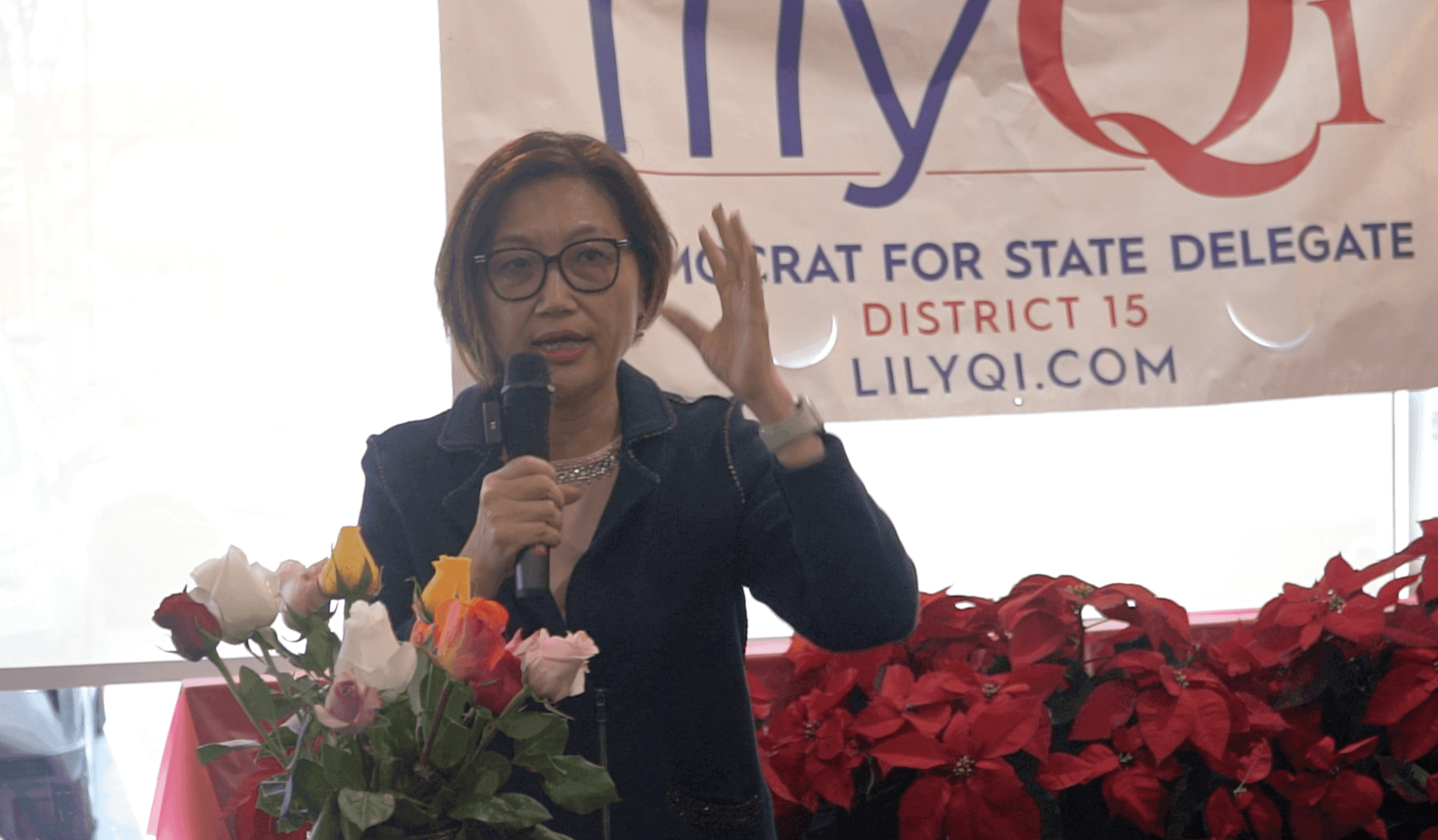The Lost and Found of Chinese Language Program at Maryland’s Montgomery County Public Schools

CLARKSBURG, Md. — Back-to-school season is a routine event for students every year at summer end, but returning to their Chinese language class is especially meaningful for Maria Chen and her classmates, eighth graders at Hallie Wells Middle School. They nearly lost the opportunity, but ultimately, they got it back.
Several public schools in Montgomery County, Maryland decided to cut their world language programs due to a $30 million budget reduction this school year. Among the languages affected was Chinese. However, after advocacy efforts by affected families and Asian American grassroots organizations, some schools, including Hallie Wells Middle School, reinstated their Chinese language programs. This allows students like Chen to continue studying their heritage language and sharing the beauty of this ancient Eastern language with their non-Chinese peers.
Great Loss for Students and Families
Mandarin Chinese is Chen’s native language. Born into a Chinese immigrant family, Chen primarily speaks Chinese at home. Her parents began sending her to weekend Chinese school when she was in third grade. Chen’s mother, Lingyan Liu, said that mastering their native language is essential for her daughters to appreciate their culture and maintain connections with family and relatives still living in China.
Chen is fluent in spoken Chinese, but reading and writing in Chinese remained a challenge. Weekend Chinese school helped, but it was only two hours per week. Learning a language requires immersion and repetition. The Chinese course offered at Hallie Wells Middle School provided daily classes, taught by native Chinese speakers who are also professionally trained and certified.
Over the past two years, Chen's Chinese improved significantly. She can now write a 700-word essay expressing her deep thoughts in Chinese, which has truly impressed her parents."We never expected this. Her Chinese vocabulary has grown tremendously thanks to the school classes," Liu said.
Chen and her classmates received a letter near the end of the last school year, informing them that the Chinese language class would not continue this year, without offering a detailed explanation.
“I was really surprised, and then I felt really frustrated,” Chen said, as it meant she would need to take a new language to earn credits. Chen’s mother was even more concerned. “It felt like discrimination against our Chinese American community,” Liu recalled as her initial reaction to receiving the letter. Many parents in the Chinese American community shared Liu’s concerns, even those whose children weren’t enrolled in Chinese classes.
According to Karen He, a Chinese teacher at Montgomery County Public Schools, most of her students are not of Chinese heritage. However, when news spread about the possible cut to the Chinese language program, many Chinese families, whether their children were in the class or not, passionately discussed the issue and brought it to the attention of Montgomery County Public School Education Board members including Julie Yang, who is also Chinese American.
Advocate for Their Language and Pride
Yang took the issue seriously. She explained to the Chinese community that the entire world language program within Montgomery County Public Schools was affected, and the Chinese language program was not the only one impacted. The budget cuts were so severe that many programs beyond language, such as the Montgomery Virtual Academy, had to close. She clarified that this was not discrimination against the Chinese community.
How to manage budget cuts at individual schools was up to the school principals. Yang encouraged students and parents to communicate directly with their principals.
The first to take action was an Indian American boy, one of the most dedicated students in He’s class. He launched a petition, inviting students and parents to sign and donate to help save the Chinese language program. Within days, they gathered dozens of signatures and hundreds of dollars of donations. The students also handed out sticky notes with the principal's contact information, encouraging people to email and advocate for the program.
Meanwhile, Chinese parents reached out to their community organization, the Chinese American Parents Association of Montgomery County (CAPA-MC), to raise awareness about the issue and voice their concerns. After verifying the facts with various stakeholders, CAPA-MC president Ting Mei Chau emailed the principals of the schools that decided to cut the Chinese language program.
“This action to cut a language program like Chinese in Clarksburg, not only impact[s] our students and long-term healthy development of this program (as it's less than 5 years), [but] could also be interpreted as a slap on the face to Clarksburg's AAPI community,” Chau wrote in the email, noting that Asians make up 40% of Clarksburg's population. “Having a Chinese program has been a pride for our community here, frankly.”
Chau sent the same email to the principals three times without receiving a response. She then called the school principals and left voice messages. At the same time, she raised the issue on the school’s Facebook pages and in parent WhatsApp groups. The principal of Clarksburg High School agreed to meet with her in person but canceled at the last minute due to a scheduling conflict.
“I was quite disappointed, to be honest,” Chau said. She made every effort to voice the issue blatantly but admitted, “At the beginning, I wasn't really that optimistic.” Chau understood that Chinese classes are not as popular as Spanish. “So I wasn't that hopeful. But it didn't stop me from trying and going with every possible way.”
Yang brought the issue to the attention of the Montgomery County Public Schools central office and the chief of academic programs. She emphasized the importance of maintaining continuity in language programs and the challenges students would face if the Chinese language program were cut.
"They might need to switch to a different language, which wouldn't be as beneficial for their language development," Yang stated.
Lost and Found
A few days into summer break, both Hallie Wells Middle School and Clarksburg Middle School informed their teachers and students that the Chinese language programs would be reinstated—again, without explaining. Neither principal responded to Yuan Media’s interview requests.
He said she was pleasantly surprised when she learned that her Chinese classes had been restored. He was assured a full-time position with Montgomery County Public Schools, regardless of any changes to the curriculum, so she wasn’t concerned about losing her job due to the potential cut of the Chinese language program. However, she was eager to preserve the program, not only because she had invested significant effort in building it from the ground up, but also because she wanted to share the beauty of her mother tongue.
“Chinese is a very beautiful language, and our culture is so enriched. I want to give students the best we can to promote our culture,” He said. “It's more than just teaching them to write characters and memorize some text… We want to show students that learning a language is really opening a door to another culture.”
During her time at Montgomery County Public Schools, the number of students in her Chinese language class grew from just a dozen to nearly a hundred, with more than 80% being non-Chinese heritage students. With the reinstatement, He planned to promote the Chinese language program to elementary school students, raising awareness about the option at an earlier age to boost enrollment.
Chau advocated for keeping the Chinese language program not only because it is her native language but also because she believes that learning a second language offers many benefits. “One language equals one world,” her father used to tell her when she was young. “The world has all the uniqueness that you will never explore unless you learn that language,” Chau added.
This wasn’t the first time Chau had advocated for education issues on behalf of her culture and community. Though the outcome this time was more positive than expected, Chau reflected that the Chinese community needs to be more visible and engaged within the public school system. She highlighted the importance of developing long-term strategies to spark broader interest in the Chinese language and culture, “not just through cultural parade or food shows once a year.”
From the perspective of the Board of Education member, Yang said that CAPA-MC and the feedbacks from students and families provided useful input to help principals make their decisions. She also encouraged parents and students to be more proactive in sharing positive feedbacks about the language program, noting that it’s often too late when praise only comes after the program is at risk of being cut.
“If you really enjoy your language program... tell someone! Let them know these are the things that make you want to go to school every single day,” Yang said.

 Pingping Yin
Pingping Yin Adam Wang
Adam Wang Brian Wang
Brian Wang



